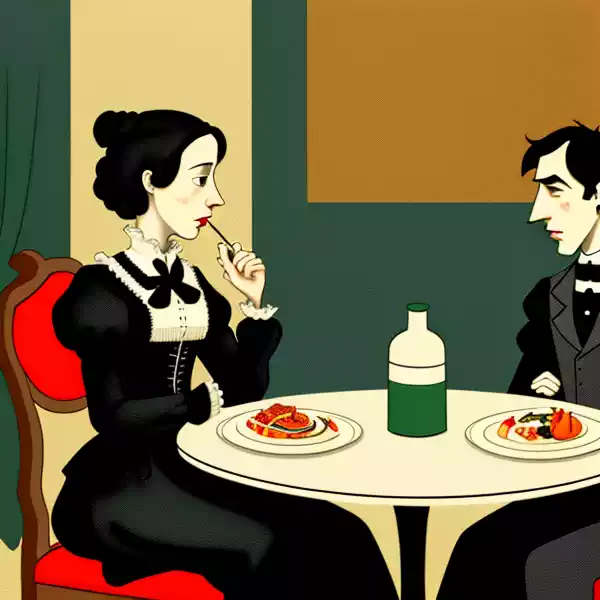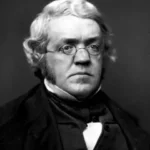 | |
A Little Dinner at Timmins’s | |
| Author | William Makepeace Thackeray |
|---|---|
| Published |
1832
|
| Language | English |
| Nationality | British |
| Genre | Satire, Victorian Literature |
1832 Short Story
A Little Dinner at Timmins’s
A Little Dinner at Timmins’s is an English Satire, Victorian Literature short story by British writer William Makepeace Thackeray. It was first published in 1832.
A Little Dinner at Timmins’s
by William Makepeace Thackeray
I.
Mr. and Mrs. Fitzroy Timmins live in Lilliput Street, that neat little street which runs at right angles with the Park and Brobdingnag Gardens. It is a very genteel neighborhood, and I need not say they are of a good family.
Especially Mrs. Timmins, as her mamma is always telling Mr. T. They are Suffolk people, and distantly related to the Right honorable the Earl of Bungay.
Besides his house in Lilliput Street, Mr. Timmins has chambers in Fig-tree Court, Temple, and goes the Northern Circuit.
The other day, when there was a slight difference about the payment of fees between the great Parliamentary Counsel and the Solicitors, Stoke and Pogers, of Great George Street, sent the papers of the Lough Foyle and Lough Corrib Junction Railway to Mr. Fitzroy Timmins, who was so elated that he instantly purchased a couple of looking-glasses for his drawing-rooms (the front room is 16 by 12, and the back, a tight but elegant apartment, 10 ft. 6 by 8 ft. 4), a coral for the baby, two new dresses for Mrs. Timmins, and a little rosewood desk, at the Pantechnicon, for which Rosa had long been sighing, with crumpled legs, emerald-green and gold morocco top, and drawers all over.
Mrs. Timmins is a very pretty poetess (her “Lines to a Faded Tulip” and her “Plaint of Plinlimmon” appeared in one of last year’s Keepsakes); and Fitzroy, as he impressed a kiss on the snowy forehead of his bride, pointed out to her, in one of the innumerable pockets of the desk, an elegant ruby-tipped pen, and six charming little gilt blank books, marked “My Books,” which Mrs. Fitzroy might fill, he said, (he is an Oxford man, and very polite,) “with the delightful productions of her Muse.” Besides these books, there was pink paper, paper with crimson edges, lace paper, all stamped with R. F. T. (Rosa Fitzroy Timmins) and the hand and battle-axe, the crest of the Timminses (and borne at Ascalon by Roaldus de Timmins, a crusader, who is now buried in the Temple Church, next to Serjeant Snooks), and yellow, pink, light-blue and other scented sealing waxes, at the service of Rosa when she chose to correspond with her friends.
Rosa, you may be sure, jumped with joy at the sight of this sweet present; called her Charles (his first name is Samuel, but they have sunk that) the best of men; embraced him a great number of times, to the edification of her buttony little page, who stood at the landing; and as soon as he was gone to chambers, took the new pen and a sweet sheet of paper, and began to compose a poem.
“What shall it be about?” was naturally her first thought. “What should be a young mother’s first inspiration?” Her child lay on the sofa asleep before her; and she began in her neatest hand–
“LINES
“ON MY SON BUNGAY DE BRACY GASHLEIGH TYMMYNS, AGED TEN MONTHS.
“Tuesday.
“How beautiful! how beautiful thou seemest,
My boy, my precious one, my rosy babe!
Kind angels hover round thee, as thou dreamest:
Soft lashes hide thy beauteous azure eye which gleamest.”
“Gleamest? thine eye which gleamest? Is that grammar?” thought Rosa, who had puzzled her little brains for some time with this absurd question, when the baby woke. Then the cook came up to ask about dinner; then Mrs. Fundy slipped over from No. 27 (they are opposite neighbors, and made an acquaintance through Mrs. Fundy’s macaw); and a thousand things happened. Finally, there was no rhyme to babe except Tippoo Saib (against whom Major Gashleigh, Rosa’s grandfather, had distinguished himself), and so she gave up the little poem about her De Bracy.
Nevertheless, when Fitzroy returned from chambers to take a walk with his wife in the Park, as he peeped through the rich tapestry hanging which divided the two drawing-rooms, he found his dear girl still seated at the desk, and writing, writing away with her ruby pen as fast as it could scribble.
“What a genius that child has!” he said; “why, she is a second Mrs. Norton!” and advanced smiling to peep over her shoulder and see what pretty thing Rosa was composing.
It was not poetry, though, that she was writing, and Fitz read as follows:–
“LILLIPUT STREET, Tuesday, 22nd May.
“Mr. and Mr. Fitzroy Tymmyns request the pleasure of Sir Thomas and Lady Kicklebury’s company at dinner on Wednesday, at 7 1/2 o’clock.”
“My dear!” exclaimed the barrister, pulling a long face.
“Law, Fitzroy!” cried the beloved of his bosom, “how you do startle one!”
“Give a dinner-party with our means!” said he.
“Ain’t you making a fortune, you miser?” Rosa said. “Fifteen guineas a day is four thousand five hundred a year; I’ve calculated it.” And, so saying, she rose and taking hold of his whiskers (which are as fine as those of any man of his circuit,) she put her mouth close up against his and did something to his long face, which quite changed the expression of it; and which the little page heard outside the door.
“Our dining-room won’t hold ten,” he said.
“We’ll only ask twenty, my love. Ten are sure to refuse in this season, when everybody is giving parties. Look, here is the list.”
“Earl and Countess of Bungay, and Lady Barbara Saint Mary’s.”
“You are dying to get a lord into the house,” Timmins said (HE had not altered his name in Fig-tree Court yet, and therefore I am not so affected as to call him TYMMYNS).
“Law, my dear, they are our cousins, and must be asked,” Rosa said.
“Let us put down my sister and Tom Crowder, then.”
“Blanche Crowder is really so VERY fat, Fitzroy,” his wife said, “and our rooms are so VERY small.”
Fitz laughed. “You little rogue,” he said, “Lady Bungay weighs two of Blanche, even when she’s not in the f–”
“Fiddlesticks!” Rose cried out. “Doctor Crowder really cannot be admitted: he makes such a noise eating his soup, that it is really quite disagreeable.” And she imitated the gurgling noise performed by the Doctor while inhausting his soup, in such a funny way that Fitz saw inviting him was out of the question.
“Besides, we mustn’t have too many relations,” Rosa went on. “Mamma, of course, is coming. She doesn’t like to be asked in the evening; and she’ll bring her silver bread-basket and her candlesticks, which are very rich and handsome.”
“And you complain of Blanche for being too stout!” groaned out Timmins.
“Well, well, don’t be in a pet,” said little Rosa. “The girls won’t come to dinner; but will bring their music afterwards.” And she went on with the list.
“Sir Thomas and Lady Kicklebury, 2. No saying no: we MUST ask them, Charles. They are rich people, and any room in their house in Brobdingnag Gardens would swallow up OUR humble cot. But to people in OUR position in SOCIETY they will be glad enough to come. The city people are glad to mix with the old families.”
“Very good,” says Fitz, with a sad face of assent–and Mrs. Timmins went on reading her list.
“Mr. and Mrs. Topham Sawyer, Belgravine Place.”
“Mrs. Sawyer hasn’t asked you all the season. She gives herself the airs of an empress; and when–”
“One’s Member, you know, my dear, one must have,” Rosa replied, with much dignity as if the presence of the representative of her native place would be a protection to her dinner. And a note was written and transported by the page early next morning to the mansion of the Sawyers, in Belgravine Place.
The Topham Sawyers had just come down to breakfast; Mrs. T. in her large dust-colored morning-dress and Madonna front (she looks rather scraggy of a morning, but I promise you her ringlets and figure will stun you of an evening); and having read the note, the following dialogue passed:–
Mrs. Topham Sawyer.–“Well, upon my word, I don’t know where things will end. Mr. Sawyer, the Timminses have asked us to dinner.”
Mr. Topham Sawyer.–“Ask us to dinner! What d—– impudence!”
Mrs. Topham Sawyer.–“The most dangerous and insolent revolutionary principles are abroad, Mr. Sawyer; and I shall write and hint as much to these persons.”
Mr. Topham Sawyer.–“No, d— it, Joanna: they are my constituents and we must go. Write a civil note, and say we will come to their party.” (He resumes the perusal of ‘The times,’ and Mrs. Topham Sawyer writes)–
“MY DEAR ROSA,–We shall have GREAT PLEASURE in joining your little party. I do not reply in the third person, as WE ARE OLD FRIENDS, you know, and COUNTRY NEIGHBORS. I hope your mamma is well: present my KINDEST REMEMBRANCES to her, and I hope we shall see much MORE of each other in the summer, when we go down to the Sawpits (for going abroad is out of the question in these DREADFUL TIMES). With a hundred kisses to your dear little PET,
“Believe me your attached
“J. T. S.”
She said Pet, because she did not know whether Rosa’s child was a girl or boy: and Mrs. Timmins was very much pleased with the kind and gracious nature of the reply to her invitation.
II.
The next persons whom little Mrs. Timmins was bent upon asking, were Mr. and Mrs. John Rowdy, of the firm of Stumpy, Rowdy and Co., of Brobdingnag Gardens, of the Prairie, Putney, and of Lombard Street, City.
Mrs. Timinins and Mrs. Rowdy had been brought up at the same school together, and there was always a little rivalry between them, from the day when they contended for the French prize at school to last week, when each had a stall at the Fancy Fair for the benefit of the Daughters of Decayed Muffin-men; and when Mrs. Timmins danced against Mrs. Rowdy in the Scythe Mazurka at the Polish Ball, headed by Mrs. Hugh Slasher. Rowdy took twenty-three pounds more than Timmins in the Muffin transaction (for she had possession of a kettle-holder worked by the hands of R-y-lty, which brought crowds to her stall); but in the Mazurka Rosa conquered: she has the prettiest little foot possible (which in a red boot and silver heel looked so lovely that even the Chinese ambassador remarked it), whereas Mrs. Rowdy’s foot is no trifle, as Lord Cornbury acknowledged when it came down on his lordship’s boot-tip as they danced together amongst the Scythes.
“These people are ruining themselves,” said Mrs. John Rowdy to her husband, on receiving the pink note. It was carried round by that rogue of a buttony page in the evening; and he walked to Brobdingnag Gardens, and in the Park afterwards, with a young lady who is kitchen-maid at 27, and who is not more than fourteen years older than little Buttons.
“These people are ruining themselves,” said Mrs. John to her husband. “Rosa says she has asked the Bungays.”
“Bungays indeed! Timmins was always a tuft-hunter,” said Rowdy, who had been at college with the barrister, and who, for his own part, has no more objection to a lord than you or I have; and adding, “Hang him, what business has HE to be giving parties?” allowed Mrs. Rowdy, nevertheless, to accept Rosa’s invitation.
“When I go to business to-morrow, I will just have a look at Mr. Fitz’s account,” Mr. Rowdy thought; “and if it is overdrawn, as it usually is, why . . .” The announcement of Mrs. Rowdy’s brougham here put an end to this agreeable train of thought; and the banker and his lady stepped into it to join a snug little family-party of two-and-twenty, given by Mr. and Mrs. Secondchop at their great house on the other side of the Park.
“Rowdys 2, Bungays 3, ourselves and mamma 3, 2 Sawyers,” calculated little Rosa.
“General Gulpin,” Rosa continued, “eats a great deal, and is very stupid, but he looks well at table with his star and ribbon. Let us put HIM down!” and she noted down “Sir Thomas and Lady Gulpin, 2. Lord Castlemouldy, 1.”
“You will make your party abominably genteel and stupid,” groaned Timmins. “Why don’t you ask some of our old friends? Old Mrs. Portman has asked us twenty times, I am sure, within the last two years.”
“And the last time we went there, there was pea-soup for dinner!” Mrs. Timmins said, with a look of ineffable scorn.
“Nobody can have been kinder than the Hodges have always been to us; and some sort of return we might make, I think.”
“Return, indeed! A pretty sound it is on the staircase to hear ‘Mr. and Mrs. ‘Odge and Miss ‘Odges’ pronounced by Billiter, who always leaves his h’s out. No, no: see attorneys at your chambers, my dear–but what could the poor creatures do in OUR society?” And so, one by one, Timmins’s old friends were tried and eliminated by Mrs. Timmins, just as if she had been an Irish Attorney-General, and they so many Catholics on Mr. Mitchel’s jury.
Mrs. Fitzroy insisted that the party should be of her very best company. Funnyman, the great wit, was asked, because of his jokes; and Mrs. Butt, on whom he practises; and Potter, who is asked because everybody else asks him; and Mr. Ranville Ranville of the Foreign Office, who might give some news of the Spanish squabble; and Botherby, who has suddenly sprung up into note because he is intimate with the French Revolution, and visits Ledru-Rollin and Lamartine. And these, with a couple more who are amis de la maison, made up the twenty, whom Mrs. Timmins thought she might safely invite to her little dinner.
But the deuce of it was, that when the answers to the invitations came back, everybody accepted! Here was a pretty quandary. How they were to get twenty into their dining-room was a calculation which poor Timmins could not solve at all; and he paced up and down the little room in dismay.
“Pooh!” said Rosa with a laugh. “Your sister Blanche looked very well in one of my dresses last year; and you know how stout she is. We will find some means to accommodate them all, depend upon it.”
Mrs. John Rowdy’s note to dear Rosa, accepting the latter’s invitation, was a very gracious and kind one; and Mrs. Fitz showed it to her husband when he came back from chambers. But there was another note which had arrived for him by this time from Mr. Rowdy–or rather from the firm; and to the effect that Mr. F. Timmins had overdrawn his account 28L. 18s. 6d., and was requested to pay that sum to his obedient servants, Stumpy, Rowdy and Co.
*****
And Timmins did not like to tell his wife that the contending parties in the Lough Foyle and Lough Corrib Railroad had come to a settlement, and that the fifteen guineas a day had consequently determined. “I have had seven days of it, though,” he thought; “and that will be enough to pay for the desk, the dinner, and the glasses, and make all right with Stumpy and Rowdy.”
III.
The cards for dinner having been issued, it became the duty of Mrs. Timmins to make further arrangements respecting the invitations to the tea-party which was to follow the more substantial meal.
These arrangements are difficult, as any lady knows who is in the habit of entertaining her friends. There are–
People who are offended if you ask them to tea whilst others have been asked to dinner;
People who are offended if you ask them to tea at all; and cry out furiously, “Good heavens! Jane my love, why do these Timminses suppose that I am to leave my dinner-table to attend their —– soiree?” (the dear reader may fill up the —– to any strength, according to his liking)–or, “Upon my word, William my dear, it is too much to ask us to pay twelve shillings for a brougham, and to spend I don’t know how much in gloves, just to make our curtsies in Mrs. Timmins’s little drawing-room.” Mrs. Moser made the latter remark about the Timmins affair, while the former was uttered by Mr. Grumpley, barrister-at-law, to his lady, in Gloucester Place.
That there are people who are offended if you don’t ask them at all, is a point which I suppose nobody will question. Timmins’s earliest friend in life was Simmins, whose wife and family have taken a cottage at Mortlake for the season.
“We can’t ask them to come out of the country,” Rosa said to her Fitzroy–(between ourselves, she was delighted that Mrs. Simmins was out of the way, and was as jealous of her as every well-regulated woman should be of her husband’s female friends)–“we can’t ask them to come so far for the evening.”
“Why, no, certainly.” said Fitzroy, who has himself no very great opinion of a tea-party; and so the Simminses were cut out of the list.
And what was the consequence? The consequence was, that Simmins and Timmins cut when they met at Westminster; that Mrs. Simmins sent back all the books which she had borrowed from Rosa, with a withering note of thanks; that Rosa goes about saying that Mrs. Simmins squints; that Mrs. S., on her side, declares that Rosa is crooked, and behaved shamefully to Captain Hicks in marrying Fitzroy over him, though she was forced to do it by her mother, and prefers the Captain to her husband to this day. If, in a word, these two men could be made to fight, I believe their wives would not be displeased; and the reason of all this misery, rage, and dissension, lies in a poor little twopenny dinner-party in Lilliput Street.
Well, the guests, both for before and after meat, having been asked, old Mrs. Gashleigh, Rosa’s mother–(and, by consequence, Fitzroy’s DEAR mother-in-law, though I promise you that “dear” is particularly sarcastic)–Mrs. Gashleigh of course was sent for, and came with Miss Eliza Gashleigh, who plays on the guitar, and Emily, who limps a little, but plays sweetly on the concertina. They live close by–trust them for that. Your mother-in-law is always within hearing, thank our stars for the attention of the dear women. The Gashleighs, I say, live close by, and came early on the morning after Rosa’s notes had been issued for the dinner.
When Fitzroy, who was in his little study, which opens into his little dining-room–one of those absurd little rooms which ought to be called a gentleman’s pantry, and is scarcely bigger than a shower-bath, or a state cabin in a ship–when Fitzroy heard his mother-in-law’s knock, and her well-known scuffling and chattering in the passage–in which she squeezed up young Buttons, the page, while she put questions to him regarding baby, and the cook’s health, and whether she had taken what Mrs. Gashleigh had sent overnight, and the housemaid’s health, and whether Mr. Timmins had gone to chambers or not–and when, after this preliminary chatter, Buttons flung open the door, announcing–“Mrs. Gashleigh and the young ladies,” Fitzroy laid down his Times newspaper with an expression that had best not be printed here, and took his hat and walked away.
Mrs. Gashleigh has never liked him since he left off calling her mamma, and kissing her. But he said he could not stand it any longer–he was hanged if he would. So he went away to chambers, leaving the field clear to Rosa, mamma, and the two dear girls.
Or to one of them, rather: for before leaving the house, he thought he would have a look at little Fitzroy up stairs in the nursery, and he found the child in the hands of his maternal aunt Eliza, who was holding him and pinching him as if he had been her guitar, I suppose; so that the little fellow bawled pitifully–and his father finally quitted the premises.
No sooner was he gone, although the party was still a fortnight off, than the women pounced upon his little study, and began to put it in order. Some of his papers they pushed up over the bookcase, some they put behind the Encyclopaedia. Some they crammed into the drawers–where Mrs. Gashleigh found three cigars, which she pocketed, and some letters, over which she cast her eye; and by Fitz’s return they had the room as neat as possible, and the best glass and dessert-service mustered on the study table.
It was a very neat and handsome service, as you may be sure Mrs. Gashleigh thought, whose rich uncle had purchased it for the young couple, at Spode and Copeland’s; but it was only for twelve persons.
It was agreed that it would be, in all respects, cheaper and better to purchase a dozen more dessert-plates; and with “my silver basket in the centre,” Mrs. G. said (she is always bragging about that confounded bread-basket), “we need not have any extra china dishes, and the table will look very pretty.”
On making a roll-call of the glass, it was calculated that at least a dozen or so tumblers, four or five dozen wines, eight water-bottles, and a proper quantity of ice-plates, were requisite; and that, as they would always be useful, it would be best to purchase the articles immediately. Fitz tumbled over the basket containing them, which stood in the hall as he came in from chambers, and over the boy who had brought them–and the little bill.
The women had had a long debate, and something like a quarrel, it must be owned, over the bill of fare. Mrs. Gashleigh, who had lived a great part of her life in Devonshire, and kept house in great state there, was famous for making some dishes, without which, she thought, no dinner could be perfect. When she proposed her mock-turtle, and stewed pigeons, and gooseberry-cream, Rosa turned up her nose–a pretty little nose it was, by the way, and with a natural turn in that direction.
“Mock-turtle in June, mamma!” said she.
“It was good enough for your grandfather, Rosa,” the mamma replied: “it was good enough for the Lord High Admiral, when he was at Plymouth; it was good enough for the first men in the county, and relished by Lord Fortyskewer and Lord Rolls; Sir Lawrence Porker ate twice of it after Exeter races; and I think it might be good enough for–”
“I will NOT have it, mamma!” said Rosa, with a stamp of her foot; and Mrs. Gashleigh knew what resolution there was in that. Once, when she had tried to physic the baby, there had been a similar fight between them.
So Mrs. Gashleigh made out a carte, in which the soup was left with a dash–a melancholy vacuum; and in which the pigeons were certainly thrust in among the entrees; but Rosa determined they never should make an entree at all into HER dinner-party, but that she would have the dinner her own way.
When Fitz returned, then, and after he had paid the little bill of 6L. 14s. 6d. for the glass, Rosa flew to him with her sweetest smiles, and the baby in her arms. And after she had made him remark how the child grew every day more and more like him, and after she had treated him to a number of compliments and caresses, which it were positively fulsome to exhibit in public, and after she had soothed him into good humor by her artless tenderness, she began to speak to him about some little points which she had at heart.
She pointed out with a sigh how shabby the old curtains looked since the dear new glasses which her darling Fitz had given her had been put up in the drawing-room. Muslin curtains cost nothing, and she must and would have them.
The muslin curtains were accorded. She and Fitz went and bought them at Shoolbred’s, when you may be sure she treated herself likewise to a neat, sweet pretty half-mourning (for the Court, you know, is in mourning)–a neat sweet barege, or calimanco, or bombazine, or tiffany, or some such thing; but Madame Camille, of Regent Street, made it up, and Rosa looked like an angel in it on the night of her little dinner.
“And, my sweet,” she continued, after the curtains had been accorded, “mamma and I have been talking about the dinner. She wants to make it very expensive, which I cannot allow. I have been thinking of a delightful and economical plan, and you, my sweetest Fitz, must put it into execution.”
“I have cooked a mutton-chop when I was in chambers,” Fitz said with a laugh. “Am I to put on a cap and an apron?”
“No: but you are to go to the ‘Megatherium Club’ (where, you wretch, you are always going without my leave), and you are to beg Monsieur Mirobolant, your famous cook, to send you one of his best aides-de-camp, as I know he will, and with his aid we can dress the dinner and the confectionery at home for ALMOST NOTHING, and we can show those purse-proud Topham Sawyers and Rowdys that the HUMBLE COTTAGE can furnish forth an elegant entertainment as well as the gilded halls of wealth.”
Fitz agreed to speak to Monsieur Mirobolant. If Rosa had had a fancy for the cook of the Prime Minister, I believe the deluded creature of a husband would have asked Lord John for the loan of him.
IV.
Fitzroy Timmins, whose taste for wine is remarkable for so young a man, is a member of the committee of the “Megatherium Club,” and the great Mirobolant, good-natured as all great men are, was only too happy to oblige him. A young friend and protege of his, of considerable merit, M. Cavalcadour, happened to be disengaged through the lamented death of Lord Hauncher, with whom young Cavalcadour had made his debut as an artist. He had nothing to refuse to his master, Mirobolant, and would impress himself to be useful to a gourmet so distinguished as Monsieur Timmins. Fitz went away as pleased as Punch with this encomium of the great Mirobolant, and was one of those who voted against the decreasing of Mirobolant’s salary, when the measure was proposed by Mr. Parings, Colonel Close, and the Screw party in the committee of the club.
Faithful to the promise of his great master, the youthful Cavalcadour called in Lilliput Street the next day. A rich crimson velvet waistcoat, with buttons of blue glass and gold, a variegated blue satin stock, over which a graceful mosaic chain hung in glittering folds, a white hat worn on one side of his long curling ringlets, redolent with the most delightful hair-oil–one of those white hats which looks as if it had been just skinned–and a pair of gloves not exactly of the color of beurre frais, but of beurre that has been up the chimney, with a natty cane with a gilt knob, completed the upper part at any rate, of the costume of the young fellow whom the page introduced to Mrs. Timmins.
Her mamma and she had been just having a dispute about the gooseberry-cream when Cavalcadour arrived. His presence silenced Mrs. Gashleigh; and Rosa, in carrying on a conversation with him in the French language–which she had acquired perfectly in an elegant finishing establishment in Kensington Square–had a great advantage over her mother, who could only pursue the dialogue with very much difficulty, eying one or other interlocutor with an alarmed and suspicious look, and gasping out “We” whenever she thought a proper opportunity arose for the use of that affirmative.
“I have two leetl menus weez me,” said Cavalcadour to Mrs. Gashleigh.
“Minews–yes,–oh, indeed?” answered the lady.
“Two little cartes.”
“Oh, two carts! Oh, we,” she said. “Coming, I suppose?” And she looked out of the window to see if they were there.
Cavalcadour smiled. He produced from a pocket-book a pink paper and a blue paper, on which he had written two bills of fare–the last two which he had composed for the lamented Hauncher–and he handed these over to Mrs. Fitzroy.
The poor little woman was dreadfully puzzled with these documents, (she has them in her possession still,) and began to read from the pink one as follows:–
"DINER POUR 16 PERSONNES.Potage (clair) a la Rigodon.
Do. a la Prince de Tombuctou.Deux Poissons.
Saumon de Severne Rougets Gratines
a la Boadicee. a la Cleopatre.Deux Releves.
Le Chapeau-a-trois-cornes farci a la Robespierre.
Le Tire-botte a l'Odalisque.Six Entrees.
Saute de Hannetons a l'Epingliere.
Cotelettes a la Megatherium.
Bourrasque de Veau a la Palsambleu.
Laitances de Carpe en goguette a la Reine Pomare.
Turban de Volaille a l'Archeveque de Cantorbery."
And so on with the entremets, and hors d’oeuvres, and the rotis, and the releves.
“Madame will see that the dinners are quite simple,” said M. Cavalcadour.
“Oh, quite!” said Rosa, dreadfully puzzled.
“Which would Madame like?”
“Which would we like, mamma?” Rosa asked; adding, as if after a little thought, “I think, sir, we should prefer the blue one.” At which Mrs. Gashleigh nodded as knowingly as she could; though pink or blue, I defy anybody to know what these cooks mean by their jargon.
“If you please, Madame, we will go down below and examine the scene of operations,” Monsieur Cavalcadour said; and so he was marshalled down the stairs to the kitchen, which he didn’t like to name, and appeared before the cook in all his splendor.
He cast a rapid glance round the premises, and a smile of something like contempt lighted up his features. “Will you bring pen and ink, if you please, and I will write down a few of the articles which will be necessary for us? We shall require, if you please, eight more stew-pans, a couple of braising-pans, eight saute-pans, six bainmarie-pans, a freezing-pot with accessories, and a few more articles of which I will inscribe the names.” And Mr. Cavalcadour did so, dashing down, with the rapidity of genius, a tremendous list of ironmongery goods, which he handed over to Mrs. Timmins. She and her mamma were quite frightened by the awful catalogue.
“I will call three days hence and superintend the progress of matters; and we will make the stock for the soup the day before the dinner.”
“Don’t you think, sir,” here interposed Mrs. Gashleigh, “that one soup–a fine rich mock-turtle, such as I have seen in the best houses in the West of England, and such as the late Lord Fortyskewer–”
“You will get what is wanted for the soups, if you please,” Mr. Cavalcadour continued, not heeding this interruption, and as bold as a captain on his own quarter-deck: “for the stock of clear soup, you will get a leg of beef, a leg of veal, and a ham.”
“We, munseer,” said the cook, dropping a terrified curtsy: “a leg of beef, a leg of veal, and a ham.”
“You can’t serve a leg of veal at a party,” said Mrs. Gashleigh; “and a leg of beef is not a company dish.”
“Madame, they are to make the stock of the clear soup,” Mr. Cavalcadour said.
“WHAT!” cried Mrs. Gashleigh; and the cook repeated his former expression.
“Never, whilst I am in this house,” cried out Mrs. Gashleigh, indignantly; “never in a Christian ENGLISH household; never shall such sinful waste be permitted by ME. If you wish me to dine, Rosa, you must get a dinner less EXPENSIVE. The Right Honorable Lord Fortyskewer could dine, sir, without these wicked luxuries, and I presume my daughter’s guests can.”
“Madame is perfectly at liberty to decide,” said M. Cavalcadour. “I came to oblige Madame and my good friend Mirobolant, not myself.”
“Thank you, sir, I think it WILL be too expensive,” Rosa stammered in a great flutter; “but I am very much obliged to you.”
“Il n’y a point d’obligation, Madame,” said Monsieur Alcide Camille Cavalcadour in his most superb manner; and, making a splendid bow to the lady of the house, was respectfully conducted to the upper regions by little Buttons, leaving Rosa frightened, the cook amazed and silent, and Mrs. Gashleigh boiling with indignation against the dresser.
Up to that moment, Mrs. Blowser, the cook, who had come out of Devonshire with Mrs. Gashleigh (of course that lady garrisoned her daughter’s house with servants, and expected them to give her information of everything which took place there) up to that moment, I say, the cook had been quite contented with that subterraneous station which she occupied in life, and had a pride in keeping her kitchen neat, bright, and clean. It was, in her opinion, the comfortablest room in the house (we all thought so when we came down of a night to smoke there), and the handsomest kitchen in Lilliput Street.
But after the visit of Cavalcadour, the cook became quite discontented and uneasy in her mind. She talked in a melancholy manner over the area-railings to the cooks at twenty-three and twenty-five. She stepped over the way, and conferred with the cook there. She made inquiries at the baker’s and at other places about the kitchens in the great houses in Brobdingnag Gardens, and how many spits, bangmarry-pans, and stoo-pans they had. She thought she could not do with an occasional help, but must have a kitchen-maid. And she was often discovered by a gentleman of the police force, who was, I believe, her cousin, and occasionally visited her when Mrs. Gashleigh was not in the house or spying it:–she was discovered se







